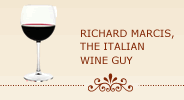The Adverse Consequences of the proposed Sharp Increase in Tariffs on Italian and Other European Wines
As you may have heard, the U.S. Government has threatened to impose a stiff increase in tariffs of up to 100 percent on imports of wines from all European Union countries. This proposed increase is a petty and misguided retaliation for perceived discriminatory taxes imposed on European operations of giant U.S. tech companies such as Google, Amazon and Facebook. In reality these giant digital firms pay next to nothing in taxes in Europe and the proposed tax is just an attempt to get these free-loading companies to pony up some much-needed tax revenues.
If the proposed tariffs on European wines is implemented, it would follow on the heels of a 25 percent tariff on certain wines from France, Germany and Spain imposed by the Office of the U.S. Trade Representative in October last year. As far as I can tell, the increase in import prices due to the initial tariff increase appears to have been absorbed by U.S. importers, distributors and retail shops and as such did not result in any significant increase in retail wine prices.
However, a 100 percent increase in tariffs on imported wines would be an entirely different story. It would not only have a deleterious impact on European wine producers but also put at risk U.S. importers and distributors of European wines and adversely impact wine prices paid by consumers in the U.S.
 Italy and France are the two largest exporters of wines to the U.S. Their wines are highly regarded by U.S. consumers because they are of their high quality and are competitively priced.
Italy and France are the two largest exporters of wines to the U.S. Their wines are highly regarded by U.S. consumers because they are of their high quality and are competitively priced.
However, the proposed increase in tariffs on wines would have a pernicious effect on European producers by increasing the costs and hence prices of their wines in the U.S. markets. As their wines would no longer be priced competitively, demand would fall and their revenues decline precipitously. Unless they can compensate by increasing sales to other countries and/or reduce costs of production, their financial viability may well be at risk.
In the U.S., the effects of increased costs due to the higher tariffs would ripple throughout the U.S. wine distribution system with importers, retailers and restaurants all adversely impacted. But it would be virtually impossible for the various companies in our multi-tiered distribution system to entirely absorb the increased import costs so the increase would ultimately be largely or entirely passed on to consumers in the form of higher prices for imported wines.
The impact of increased costs would also affect U.S. importers and distributors specializing in European wines. With higher prices and falling demand they would be at a competitive disadvantage in marketing their wines and face significant cash flow problems such that they may be forced out of business entirely. Restaurants would be adversely impacted if consumers balk at paying inflated prices for their favorite imported wines.
At this point, no timeline has yet been set as to when the proposed increase would be implemented. However, if you care about prices and/or availability of European wines in the U.S., it would make sense to make Federal officials aware of your concerns regarding the proposed tariff increases. To facilitate the process, you can click on the link https://nawr.org/nowinetariffs/ which has more detail as well as a proposed letter you can sign and send to the Office of the U.S. Trade Representative as well as to your senators and representatives.
Everyone in the wine business and anyone that loves wine, especially European wines, should take the time to comment and make their concerns known. It would be well worth the small effort involved.
Return to About Italian Wines
Special thanks to Neal Cox of MillerCox Design for the great red wine glass photo.
©Richard Marcis
January 8, 2020
Help keep this website ad-free and independent.
Consider making a contribution to support the work of WineWordsWisdom.com.


